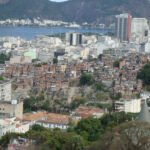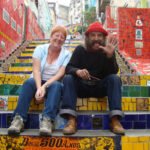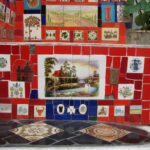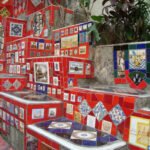Two Backpacks

Chapter 30 - Rio de Janeiro
Our relaxed mood, nurtured by four months of tranquillity in Marxequera, disappears the moment we walk through customs and into the arrival hall at Rio de Janeiro’s Galeão airport in early October 2010.
The crush as we exit makes finding the taxi driver I’d booked impossible.
Ron and I stand to one side as the crowd behind the barrier edges further forward, eager to glimpse the new arrivals.
‘We’re never going to find him in this crush, Ron. Let’s make our way over to the far side of the hall. Maybe we can spot him from there,’ I suggest, shouldering my backpack.
Ron leads the way. I grab hold of one of the straps on his backpack, eager not to lose him in the dense crowd.
‘There he is! Over there, in front of that café,’ exclaims Ron. ‘Stay here. I’ll go and get him.’
Before I can reply, Ron has dumped his backpack at my feet and is pushing his way towards a man wearing a bright yellow t-shirt; he’s holding a torn piece of cardboard above his head with my name printed on it. There’s a short conversation and much gesticulation, minutes later, Ron returns.
‘He’s got another couple of backpackers to drop off. We’re to meet him outside,’ Ron advises.
It’s dark as we step from the airport building. It’s also jam-packed with people. A small car pulls up alongside us, and our driver gets out. I can see the other two passengers on the back seat.
‘Not much room. You’ll have to sit with your bags on your laps,’ advises the young, blonde male passenger with a smug grin, knowing the driver had already stowed their bags in the car’s boot.
I wedge myself onto the back seat alongside Mr. Smug’s female companion while Ron heaves my pack onto my lap. Ron is the lucky one; he’s got the front seat with space in the footwell for his bag.
Our driver sets off. A few seconds later, I’m grateful it’s Ron who’s seated up front. The driving in Rio is crazy! It’s like participating in a Formula 1 race but in a tiny, packed saloon car! Our driver undertakes, overtakes, and races through the lanes of vehicles without a glance in his rearview mirror or any thought for his passengers.
Twenty minutes later we arrive at a nondescript hostel. Our companions say nothing as they exit the car.
It’s not long before our driver pulls up at Lagoa Guest House, our home for the next six days.
The street is quiet. There’s no sign outside the high-walled property. Are we at the right place? I wonder, worried that perhaps we’re not where we’re supposed to be.
The gate to the premises is locked. I press a bell on the wall and hear chimes from within the building. A few seconds later, the gate opens to reveal an attractive young woman with long, dark wavy hair.
‘Welcome! You must be Sandi and Ron. I’m Julianna, and this is my husband, Wesley. Come in. Let us help you with your bags.’
After a welcome fruit drink, Julianna shows us to our room on the first floor.
‘I hope you enjoy your stay with us,’ she offers as she leaves us.
‘Well, it’s spacious and clean but pretty basic,’ I say, once Julianna has left.
‘I’d call it minimalistic!’ counters Ron. ‘I’m knackered. I’m going to take a shower. It feels like I’ve not slept in weeks!’
‘Me too,’ I add, unable to stop yawning.
It’s only nine o’clock, but after twenty-four hours travelling from Glasgow to Rio, we’re both ready for a good night’s sleep.
*********
It’s gone ten o’clock when we both surface.
‘I needed that,’ exclaims Ron, stretching. ‘But I reckon we’ve missed breakfast.’
We decide to walk along the shores of Lagoa Lake to Ipanema Beach.
The path takes us along tree-lined roads, the shade welcome in the heat of the day. The walk is longer than either of us anticipated and when we finally arrive at the beach, we’re both in need of a drink.
‘We’re going to have to watch our budget while we’re in Brazil,’ Ron says, paying for two cola drinks. ‘It’s a bit of a shock to the pocket after the prices in Southeast Asia.’
He’s right. Brazil is way more expensive than any country we’ve visited so far. We’ve already blown our budget of sixty Australian dollars a day for our room at the hostel and we’ve still got to buy food and drink while we’re in Rio.
Unlike hostels in Southeast Asia, it seems that in South America guests can access the hostel’s kitchen facilities.
‘That’s about all we can afford,’ I say as I exit a nearby supermarket and show Ron the few items I’ve bought, including bottled water, fruit and biscuits.
‘There’s a café next door. Let’s try there for supper,’ suggests Ron, who’s hungry after our walk around the lake.
We check the menu for something cheap but filling and order a pizza and a pasta dish, which we share.
‘A bit upmarket and expensive for our budget,’ comments Ron as we leave.
‘I think we’re going to have to cook for ourselves from now on.’
**********
It’s strange; the four-month break in Spain seems to have left Ron and me hesitant about exploring again. The feeling is alien after our time travelling independently in Southeast Asia.
‘Rio makes me nervous,’ declares Ron as we discuss what sights we want to see, back in our room. ‘I don’t know what it is, whether it’s what we’ve read about the dangers of the favelas (Rio’s shanty towns that cling to the hillsides that stand guard over the sprawling city) or simply the size of the place, but I think we should consider taking a city tour or maybe even an organised South America trip. What do you think?’
I have to admit that I feel overwhelmed at navigating our way around South America. Unlike our time in Southeast Asia, we’ve no prior experience of South America, nothing to base our decisions on and it’s unsettling us both.
Ron opens his laptop and begins checking prices for South American tours.
‘It looks like it’ll cost around two thousand dollars each,’ he says twenty minutes later.
‘That’s a huge amount of money. How long is the tour? And which countries does it cover?’
‘Eight weeks,’ replies Ron, checking the details of the tour he’s found. ‘It looks like it covers Brazil, Argentina, Chile and Peru. Lima is the finishing point; from there, we’d be on our own.’
I’m silent for a while. Taking a tour would remove any hassles obtaining visas, and we’d see most of the sights we’d planned to visit.
‘I suppose a tour makes sense, but there are a lot of places we’d miss out on. Plus, it’s really expensive.’
Ron doesn’t look convinced.
‘Look,’ I continue. ‘I think we’ll be okay once we get started. The dangers of pickpockets and muggings are greater here in Rio than other cities we plan to visit. We’ve just got to be ultra-careful.’
‘If it’s the money, I’ll help with your costs,’ Ron offers, knowing my travel fund is running low.
‘Thanks, love, but it’s not just the money. It’s the chance to explore and see sights we’d miss out on if we take that tour. The trip is only eight weeks. We planned to stay in South America for a year. I don’t want to cut the trip short just because we’re finding it tough now.’
Ron remains silent for a few minutes, obviously torn between taking the easy option of a tour or having faith in our ability to get from one place to the next safely.
‘Okay, we’ll do it your way. But you’ve got to promise that if we struggle while we’re in Brazil, we’ll return to Rio and take the tour.’
‘I’m still worried too, Ron, but unless we try, we’ll never know.’
The decision made, I cook supper in the hostel’s kitchen that night, a welcome chance to eat cheaply in this super expensive city. We head to bed early, still struggling with jet lag only to be woken two hours later by Roy, a twenty-something Irishman helping at the guest house – and Paul, a young Swedish guest. Both are high on either speed, Ice (Crystal methamphetamine) or some other drug available in Rio. Only the four of us are at the hostel; the owners having left for a weekend in the country, leaving Roy in charge.
Both men are arguing loudly in the small courtyard below our bedroom window. The vocals quickly turn to more aggressive behaviour – a fight ensues with punches thrown. The two men end up in the small swimming pool, where the altercation continues.
Ron somehow manages to sleep through it all. Thinking one of the two drug-crazed men might injure themselves, I decide to wake my slumbering other half.
‘Ron! Wake up! Roy and Paul are fighting in the pool. I’m sure they’re high on drugs! Should we go down and stop them?’
It takes a few moments for Ron to take in what I’ve said.
‘If they’re on Ice there’s nothing you can do. I’ve seen blokes on that stuff; they can get really aggressive. Best we leave them to it.’
There’s no way we can get back to sleep with the noise the two men are making, so we watch from the safety of our room.
An hour later, the two are exhausted. Both collapse onto sun-loungers and fall into a drug-induced sleep.
‘Looks like they’re going to be out for a while,’ declares Ron. ‘Come on, let’s try and get a few more hours’ sleep.’
The following morning at breakfast, neither man remembers a thing of what happened!
**********
We’re still not confident about exploring Rio, so we decide to take a city tour.
It’s a glorious day as we set off in a minivan with other backpackers of various nationalities.
Our guide certainly knows his stuff as he points out landmarks on our way to one of the tour’s highlights, the statue of Christ the Redeemer. Perched on top of Corcovado Mountain, the sculpture dominates the Rio skyline. The figure, constructed nearly one hundred years ago, is thirty-eight metres high (including its pedestal) and has an arm span of twenty-eight metres.
A promenade runs around the statue’s base. From this vantage point, we’ve got spectacular views of the bays and islands of the Rio coastline.
Although it’s only nine in the morning, the promenade is crowded. It’s difficult to get any great shots of the statue. We wander around the site and find a vantage point with views across Rio and the nearby islands – it’s breathtaking!
Our next stop is the Escadaria Selarón or Selarón steps.
Situated in the Lapa area of Rio, these world-famous steps are the work of Chilean-born artist Jorge Selarón, the steps his tribute to the Brazilian people.
As we alight from the tour bus, our guide beams and declares, ‘Selarón is here!’
The artist is just as I’d imagined him. Wearing a worn, dark blue sweater and blue jeans, he smiles as we approach his art, two hundred and fifteen steps covered in over two thousand tiles collected from more than sixty countries.
His welcoming smile is reflected in the twinkle of his eyes. His well-worn lined face is framed by dark curly hair held in some order by a red, pork pie style, felt hat. He is happy to pose for us, seated on the steps he’s so lovingly designed.
I’m over the moon when he indicates I can sit next to him for a photo.
‘Quick, Ron! Before he changes his mind.’ I thrust my camera into Ron’s outstretched hand and plonk myself beside the bushy-bearded, smiling artist.
Our fellow tourists are boarding the bus once more. Reluctantly, I follow.
Settled in our seats, we set off for Santa Teresa. Our guide tells us a little of the area’s history.
‘The neighbourhood began with the building of Santa Teresa Convent in the 1750s on Desterro Hill. In the nineteenth century, it was an affluent area, but that was long ago, and as you can see, we now have many favelas. We are going to the main square in the centre of Santa Teresa, Largo dos Guimarães. The drop-off stop for the bonde (tram) is where you’ll find many famous bars and restaurants. You will have one hour to explore. But please, don’t go too far; the area is still very volatile!’
‘An hour’s not long enough,’ I moan as we stand in the square and take in our surroundings. ‘I think we should come back again one evening. What do you reckon?’
‘Let’s try the feijoada. It’s supposed to be delicious,’ suggests Ron, pointing to a small café advertising the famous black bean and pork dish. ‘And, yes, we should come back one evening; maybe take the tram up here.’
The last stop of the tour is the one Ron’s been looking forward to the most – we’re going to watch a football match, Botafogo versus Fluminense.
There’s just time for a beer from one of the small stalls outside the stadium before our guide ushers inside to our seats. We’re in with the Botafogo fans – a wall of noise from drums and trumpets hits us as we climb the steps into the stadium.
We join the crowd, who welcome us with smiles. The atmosphere is brilliant with singing, chanting and flag-waving. Sadly, the match didn’t quite live up to the fans – a 0 -0 draw but it was a great way to end our day of sightseeing.
The following morning, we decide to take a bus into the city, a much cheaper option than another tour.
Julia has given us details of fares, bus numbers, where the nearest bus stop is to the hostel and where to get off for Copacabana Beach.
After our initial reservations about getting around, we find that using the bus service is really easy!
‘I can’t believe we were so worried, Ron!’
‘And we’re on Copacabana Beach!’ exclaims my other half, scanning the beach. I know what he’s looking for.
‘I don’t think you’ll see too many topless women today,’ I comment with a smile.
We walk along the shoreline, feeling the tug of the waves as they thunder up the shore; the seawater cools our sun-hot skin. We stop for a drink and find two wooden deckchairs beneath a sunshade. Sipping our colas, we watch hang-gliders soar on the air currents that swirl around the hills and laugh as novice hang-glider descends to land on the beach only to tumble and be dragged unceremoniously into the churning water.
‘Time to head home, I think,’ suggests Ron with a smile.
**********
It’s our last evening in Rio. We’ve decided to revisit Santa Teresa. Julia has told us there’s a festival in the main square this evening.
We take the local bus to the Cinelandia stop and then ask for directions to the tram, which is only a short walk away.
The sky begins to darken as dusk descents on the city, lights from distant buildings twinkle in the fading light.
Tram 28 first ran in 1896, a service for Rio’s well-off residents. Today, it’s full of tourists keen to enjoy the nightlife of Santa Teresa. The old tram car creaks and groans as it rattles along while passengers lean from its windows, eager to see as much as possible, Ron and I amongst them.
The square, with its many cafes and restaurants, looks enchanting with flickering candlelight dancing in the evening breeze. Music, with a Brazilian beat, drifts around us as we wander the square. Sadly, we’re too late for the festival.
‘Let’s get a drink.’ I suggest, taking Ron’s arm and leading him towards a vacant table with a great view of the city and square.
‘Well spotted!’ Ron’s hungry again; he’s already perusing the menu.
We order caipirinhas and empanadas and are happy to people-watch while we wait for our waitress to return with our food.
Refreshed but guilty that we’ve again blown our daily budget, we return to the tram stop. The crowds have gone. I have a feeling we’ve missed the last tram.
In the square, cafes are closing. An uneasiness begins to creep through my bones. I look at Ron.
‘I know. Stick close,’ he says obviously feeling the same way.
‘We need to get out of here. If the trams have stopped running, a bus is our only option. I saw one leave from the street corner on the other side of the square.’
Before I can reply, Ron’s taken my arm and is walking purposefully across the dimly lit square. There are two other people at the bus stop; one, thankfully, speaks English.
‘Yes. Right place for bus,’ the young man confirms when I ask about transport to the city centre.
‘Where do you want go?’ he asks.
As I begin to explain that we want to return to the metro, a bus pulls up. The young man talks briefly to the driver and then waves us onboard.
‘I’ve told the driver to tell you when to get off,’ he says, stepping back onto the street.
Before I can thank him, the bus doors close, and we set off towards the city. We arrive at our hostel without further hassles and decide on one last beer before bed.
‘I’m pleased we did that trip to Santa Teresa this evening. It felt good to trust in ourselves again.’
Ron nods in agreement. ‘I know what you mean. It’s taken a while to get our confidence back.’
‘I know I make a big thing about getting around on our own, Ron, but it’s what makes this journey an adventure.’
‘You’re right,’ replies Ron, finishing his beer. ‘But somehow, I think South America is going to be much more of a challenge than anything we’ve encountered so far!’











